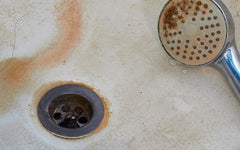We have all heard that drinking at least eight glasses of water a day is an important part of good health. But, have you ever wondered how healthy your tap water is to drink? If you’ve ever gotten a glass of water and noticed a metal taste, you’re not alone. And, metallic tasting water can be a sign that the quality of your tap water isn’t as good as it could be.
Tap water with a slight metallic taste can be fairly common. Trace amounts of zinc, iron, manganese and copper are often found in most drinking water sources. If you get your water from a municipal supplier, your water is treated with a variety of chemicals to assure it is safe to drink. Sometimes these chemicals and minerals, like chlorine, can react with the pipes or plumbing fixtures in your home. To determine if your metallic tasting water is the sign of a bigger issue, ask yourself these questions:
How old are the pipes in your home?
Old, worn-out city pipes or rusty residential pipes can be the culprit. Brass, copper or galvanized steel pipes only last around 80 to 100 years. Over time, they can slowly deteriorate, and minerals can slowly seep into your drinking water creating a metallic taste. Having your water professionally tested is a good first step to finding out exactly what’s in it.
Has your water always had a metallic taste?
Chances are you know what your tap water tastes like; and, if you travel to a different state, you might notice their tap water tastes a little different. Different city water systems utilized different treatment means. When evaluating the water quality in your own home, consider if the metallic taste has always been there or is getting worse. Was it a one-time situation, or does it occur off-and-on? Is it new? Occasional metallic-tasting water can be an issue with your city water supplier. Check with them for any issues in your area or to determine if they've changed their treatment protocols.
Does the metallic-tasting water come out of one faucet, a few faucets or every faucet?
Just like your pipes can degrade over time, so can your faucets and fixtures. If you are getting metallic tasting water out of only your kitchen faucet, try switching out the fixture, especially if it is old or showing wear.
Are you treating for softer water?
If you are using a water softener, you are likely treating your water to lower the hardness [mainly the reduction of calcium and magnesium]. Water softener systems utilize salt primarily to treat water, and can give water a taste that resembles metal. In addition to checking the hardness, you may want to check the pH. The ideal pH range for tap water is between 6.5 to 8.5, however water at the higher end of this range will have a more metallic taste. Again, checking your water can give you more insight into what you are drinking.
If you still can't pinpoint the cause of a metallic taste, we are here to help. Read more and check out our water testing kits!







